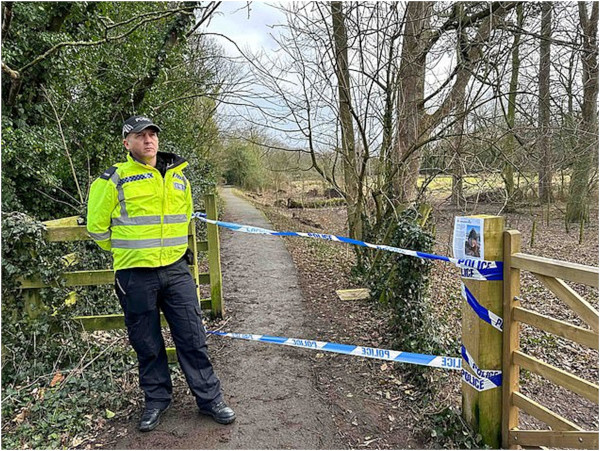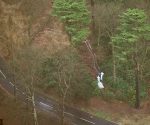Spring has come, with all its gentle showers. Methinks ’tis time to disappear a woman on the news
The 2018 drowning statistics – the latest that could be found in a brief search – are presented on the web site of the Royal Life Saving Society UK (RLSS UK), and state that, of those people who died by accidental drowning, most were lost to inland drowning rather than the coastal variety. Moreover:
The most startling fact is that the largest ‘grouping’ of people losing their lives in 2018 was once again, those people who had no intention of going into the water and were walking or running close to water (93 people).
People interested enough to look at corporate-media output peripheral to the incident of a missing person, last seen near the river at St Michael’s-on-Wyre, Lancashire, on 27th January and (with police ruling out foul play) presumed accidentally drowned, might have noticed the recent reporting of the 1978 case of Roger Jones. Jones was a 16-year old involved in a road accident which saw him flung into a tributary of the Wyre to be carried into the main body of the river at a mile upstream (i.e. towards the source) of St Michael’s, and then 8 miles in all downstream (i.e. towards the mouth) where he was washed onto a sandbank. Jones’ body wasn’t found for two months. Happening also at the end of the month of January, the conditions that dictated how Jones was treated by the river would arguably be comparable to how they would have been in the case of Nicola Bulley – the 45 year-old woman, of course, involved in the contemporary misfortune.
The location of Bulley’s phone when it was found, and the unresolved state it was discovered in, places her very close to the river bank when something unexpected happened to her. Therefore, that she fell into the river is a reasonable, and definitely not improbable explanation for her disappearance (because, as evidenced above, this sort of thing is known to happen). It is also the simplest, especially in the absence of any cause to suppose a more complicated scenario – and Lancashire Police say there is no such cause. In truth, it doesn’t amount to a great mystery that Nicola Bulley fell into the river – in fact, with it essentially being a matter of someone suffering some very bad luck that couldn’t be recovered from, it is completely plausible (the author wonders if Bulley’s bad luck involved an attack of “died suddenly”). Moreover, as history should inform, that Nicola Bulley could not be found after a week in the river is not a complication of the issue, and at this stage, dare it be said, is even irrelevant.
However, there has been a massive and clearly concerted campaign in corporate-media to have its audience suppose that something else happened to Nicola Bulley. By rights, an instance of a missing person, no matter how much a narrative wants to make out that it “doesn’t add up”, is not for national notice. And yet, Nicola Bulley’s case has been second-guessed so amply that the attention on it is wildly out of proportion. Indeed, the antics of corporate-media can be interpreted as pressuring the police to give the case a status worthy of that very high level of profile that its agents obviously want to divest upon it; in other words to force Lancashire Police to open a murder investigation.
To some, no doubt, this is fanciful stuff indeed, but there’s a very good reason, as far as the sector sees it, that corporate-media would want such an escalation of the case. The explanation, however, is for later. First of all we’re going to look at the evidence as it abounds in corporate-media doings and find plenty of justification for the accusation.
To summarise before considering examples of the conduct, the basic ways that corporate-media is operating according to its agenda are these:
Firstly, it tells its audience, one way or another, that there is no evidence Nicola Bulley fell in the river. This is a lie. The core evidence is explained above.
Secondly, corporate-media suggests to its audience, in ways that make it appear to be official doubt, that there is something untrue or unreliable about that core evidence. This is possibly the most obvious way that the conniving can be observed.
Thirdly, corporate-media will give reams of column space and air time to speculation about evidence that is not understood to exist, so-called insider knowledge that throws a different light on known evidence, and then theories based on this speculation and supposed “revelatory” aspects of information, and it will be attributed to people who really should know better (and whose motives must be questioned), whose vulnerability is being exploited, or who remain unnamed sources. And all this is related to presenting the case as a murder investigation and suggesting that the speculative evidence merely remains to be discovered if police would just act appropriately.
Generally the public should reject this sly methodology and its product because of the way that “news” corporate-media is very much over stepping and abusing its remit in the practise of it. Specifically, this particular behaviour is clearly responsible for the outlandish gossip on social media and so-called “vigilante” amateur detectivism in what is a circus around the Nicola Bulley disappearance that corporate-media likes to castigate (to appear to be distanced from and innocent of) but nevertheless at the same time will certainly see as being advantageous to its agenda because it represents body to the reality that it itself is inserting.
Moreover, at the heart of the corporate-media’s trouble making is a motive to invite people to put themselves at risk of self-incrimination and to force the hand of the police – “no body” murder convictions are a well established insult to law. This witch-hunting is ultimately the reason so utterly offensive that demands wholesale rejection of the rotted doings of corporate-media.
* * * * * *
It appears to be the case that it was on the second weekend after Bulley’s disappearance that corporate-media started to give room to friends and family to voice the opinion that there was no evidence that the river was involved in her disappearance. This was somehow seen to be acceptable, even after Lancashire Police (on 3rd February) had issued a briefing in which Superintendent Sally Riley was quoted as saying:
We have done a huge amount of work both in terms of searches of the area as well as extensive enquiries which have been going on behind the scenes and based on that work we are as sure as we can be that Nicola has not left the area where she was last seen and that very sadly for some reason she has fallen into the water.
There is absolutely nothing to suggest from all the extensive enquiries we have made that anything untoward has happened to her or that there is any third-party involvement in her disappearance.
Incidentally, the search for Bulley commenced the very next day after her disappearance with “major missing person operation” status, and it involved drones, helicopters, dogs, and took in assistance by Lancashire Fire and Rescue Service, the Bowland Pennine Mountain Rescue team and the North West Underwater Search Team. Moreover, corporate-media unwittingly produced its own disproof, in the form of images of cordoned-off areas, of charges levelled in a multitude of space given to a host of quasi authoritative figures (usually retired senior police) to complain that Lancashire Police had allowed an area around the waterside bench where Bulley’s phone was found to become contaminated before crucial evidence could be discovered. Not so, had said Sally Riley, as quoted in the Sunday Times of 5th February: the place where Bulley was thought to have entered the river “has been subjected to a detailed search”.
Undeterred, and perversely, it was this interview that corporate-media then used to support endless repetitions of the “no evidence” mantra attributed to friends and family, all because Riley had said that there was “no evidence of a slip or fall”. Quite self-evidentially, her qualification illustrates the meaningless of the detail in that one might not expect to find such indicators in any case:
I think if it had been a sloping bank, a commonsense view would be that you would expect to find scuff marks. If it is sheer and you lose your footing, you might not have any marks left on the grass.
According to photographs, the banks of the river at the location being referred to really do offer these options all at the same time, with slopes leading to precipitous edges, both as the land projects into the water at any one point and as it behaves as it continues along the sides of the river.
The very clear meaning of Riley’s statement nevertheless was lost on mendacious corporate-media which now would boldly produce headlines containing a wilful misrepresentation, just as in the following from the Daily Mail, for example: “police continue to scour river after admitting they found ‘no evidence’ she fell into it”.
The broader offence of corporate-media when it comes to a question of evidence is the decision not to see the kernel, which is the phone in an unresolved state (i.e. still logged in to a terminated meeting) in a tremendously significant location, in relation to a broader set of circumstances, as also explained by Sally Riley:
When you triangulate all the witnesses, the CCTV, the digital and the telephone, the whole picture, it produces such a tiny window for criminal involvement that it becomes highly unlikely.
What this confirms is Bulley’s known isolation from any other possible encounter or event in a given time that would lead to her disappearance, and it is a matter of fact that won’t change no matter how many suspicious individuals or tatty red vans corporate-media now suddenly wants to report (based on stories attributed to nameless sources) were “allegedly” seen in St Michael’s-on-Wyre before Bulley had her accident.
The presentation of police attitude being supportive of an alternative explanation for Bulley’s disappearance (and therefore confusingly contradictory to its stated position) has been much more expansive than the one example given above, and has mainly been achieved by the deployment of Peter Faulding, “world-leading confined space rescue and forensic search specialist” as his website advertises him to be. Although purportedly meant to have been an assistance to police in historical cases, Faulding has been nothing short of destructive with his interference in the Bulley incident. Discerning his real nature will entail examining his previous career highlights – a job not to be done at this time (except to note that he is ex-military) – but for now if the reader wants to think of him as a narcissist with a book to sell and future work to secure, utilised by a corporate-media who could compliment him by giving him exposure at every opportunity as a way to appear to be inside Lancashire Police’s investigation, it will do as well at this time as any more sinister explanation for his conduct.
Even before Faulding was involved with the Bulley case to the extent that he was conducting a limited search on the River Wyre himself, he was bad mouthing Lancashire Police: “I don’t know how the police can say there’s no evidence of third-party involvement in this disappearance when they haven’t actually checked. I think this is a mess, really.”
Sally Riley would later say that even when Faulding was at the site of the disappearance, he wasn’t “included in all the investigation detail anymore than the members of the public are that I’m briefing through these sorts of press conferences”, and knowing as much as any member of the public had the same opportunity to know, there was no basis – as shown above – for his commentary.
Nevertheless, Faulding would never relent. His most damaging initial proclamation was to call Bulley’s phone “a decoy”. What he clearly meant was that it had set up to frame Bulley as a drowning victim and to divert police from finding signs of a criminal act. Later on, exploiting a false appearance of working in partnership with the police (a state of affairs that appears never to have been established – as indicated by Riley’s comment, and to be covered in full shortly), he would make a truly breathtakingly wild comment:
This is the most baffling case that I have ever worked on. The police have nothing to go on. All they have is a mobile phone at the moment and they said it could possibly be a decoy.
This would appear in a Mirror article entitled, “Nicola Bulley police think her phone could be a decoy left by river, says expert”.
As far as Faulding could know, what with his being as a member of the public in terms of access to the internal details of the police investigation was concerned, there was no consideration of the mobile phone suggesting anything other than Bulley being a missing person, presumed fallen into the river (Lancashire Police has never mentioned the “d-word”, although in essence they are saying that she has been drowned).
By the time Faulding got on site, he had made his pre-conceived notions quite clear by declaring: “My belief is she’s not in not in the river at all.” He also set parameters for expectations based on quite false logic given that his search appears to have been restricted to four to five miles of the river: “If Nicola is in there, we will find her”. On the morning of the second day of his involvement, he elaborated: “if I rule this stretch of the river out today where we’re working I don’t think she’s here, I think there’s probably a third party involved”. Naturally, when he was finished, on the third day, and had achieved his objective (“I didn’t want to find a body”), he declared a result according to his hypothesis: “she’s not here”, he would tell Paul Ansell (Bulley’s boyfriend) at the spot by the river where the phone was found. This was a peculiar way to be “briefed by police”, as a Mirror article claimed was happening, in that it enabled journalists in close proximity to overhear what then might be supposed to be an official conclusion.
Now, we’re going to look at some information that raises doubt about Faulding’s quality whereby he’s fit to be making any conclusions about Bulley’s being in the Wyre – which is a subject connected to his persistently understating the danger that the river could have presented her. First of all, however, there needs to be a fuller dealing of why Faulding’s actual relationship with Lancashire Police might have appeared to have been official when in fact this looks not to have been the case.
One will read in corporate-media such things as “police have called in extra divers to assist in the search for [Bulley]” to explain Faulding’s active involvement in the case, but at the same time one can find something else that is probably more like the truth: “Faulding… initially said Lancashire Police had refused his offer of divers and equipment”.
It appears in the end that Faulding used an enquiry about using his services to Lancashire Police by Bulley’s family as pretext for volunteering – this is the very least that can be said for certainty, although the chatter is that there was a direct request from family that didn’t involve the police. Whatever went on to get Faulding on site, he made noises on setting out to St Michael’s-on-Wyre that made it sound all very official:
I have just had a long call with the Lancashire Police search adviser to discuss the search for Nicola. We will work closely with the police search teams who are working long hours to find Nicola.
Bearing in mind, however, that the Lancashire Police search adviser might not be a member of that force, but instead be any one of a number of professional experts who will have been consulted on this particular case, and remembering how Faulding, of course, was outside of the inside information loop, this announcement of imminent arrival potentially gives entirely the wrong impression. Indeed, there is a chance that a more accurate assessment of the interaction between Faulding and police was one of the latter tolerating the former, and having no objection to (or no power to prevent) him taking a boat out on the river.
Nonetheless, the benefit to corporate-media of Faulding having the appearance of office was in how any briefing received by him – and there was plenty of this material – could have the appearance of being sanctioned by police. The police investigation could be presented in terms of Faulding’s speculation.
And when it was reported one morning that Faulding had been speaking to Paul Ansell and asking him if Bulley “had any enemies, any stalkers”, it became clear in which dangerous direction this construction could lead. To the average Joe who never pays attention this activity risked looking like Bulley’s boyfriend was a person of interest to police.
Indeed, the subsequent interview of Ansell by Channel 5 television can be seen as an extension of the insidiousness. Ansell was found in this appearance to be “100 per cent convinced… [Bulley’s last known location is] not the river”, and of a mind that “whatever has happened”, which is a way of alleging a crime without having any evidence for it, has been committed by “somebody who knows the local area”. Not content with casting this aspersion on a community of innocent people, Ansell went on to demand that “every house, every garage, every building [be] scrutinised”, saying “I want it all searched, I want it all scrutinised – every piece of it.”
The criteria for such a search was not clear in the coverage the author is quoting from, but putting the information together one might surmise that Ansell means he wants the property of those somehow worthy of suspicion in the local area to be inspected for signs of “whatever has happened”.
Of course, while one Dan Walker, the interviewer on the Channel 5 programme, summarised Ansell as being desperate for answers, there’s another interpretation to be had: Channel 5, which won’t be innocent in doing it, has provided Ansell with a platform from which, as it could be said of him by those who have cunningly laid a trap, he doth protest too much. It was said at the top of this that corporate-media wanted to invite people to put themselves at risk of self-incrimination, and here is the prime example of what was meant.
On 10th February, Lancashire Police issued a statement on Twitter:
There is also a huge amount of commentary from so-called experts & conspiracy theories which are damaging to the investigation and, worst of all, to Nicola’s family. It must stop.
One wonders if some of this was actually levelled at Peter Faulding, an interview with whom would appear later the same day – in what could be called a damage limitation piece by the Daily Mail (which had serialised his book) – in which he tells (merely for the sake of being sensational, one suspects) of the suggestion he says he made to Paul Ansell that “Bulley could have run off with a lover”.
It’s the use of the term “so-called expert” that is pertinent for this exposé, however, because one is forced to recall Sally Riley’s comments in a press conference in apparent response to Faulding on the second day of his search activity (7th February]:
As I said on Friday, the river is a complex area to search, it’s not a still water, it’s a fast-flowing moving water that is tidal in parts, and as acknowledged by some of the many national search advisers and experts… this makes it particularly complex… as… [particular searched areas of the river] are tidal we have re-searched them to ensure that nothing has been washed back into [them].
This is all very different to Faulding’s ideas:
Normally when we deal with a drowning victim, they are where they go down. I would expect to find Nicola in the water right in front of the bench where she went down. She would not have moved, maybe two or three feet.
To be clear, Faulding seems here to be saying that Bulley would not have moved in the river the ten days that she had been in it. Whether this is objectively questionable or not, what’s more important is that it seems to conflict with other things he reportedly said in support of his idea that Bulley could not have fallen in the river. Take for instance the indirect quote where it is “his professional opinion that Bulley’s body would have been seen if it had floated any further downstream on the day she disappeared”. This is to suppose that Bulley would have moved after all. A direct quote along the same lines is as follows:
If this is where Nicola fell in you can see that the water is not particularly deep [no deeper than 3ft, reports the MailOnline agent being given this demonstration]. There are lots of rocks and if she was in the water she would be able to grab hold of them.
What can be inferred here is that Faulding supposes that Bulley could grab the river bed to prevent herself being swept away.
Maybe the key to Faulding’s flexible notions is revealed in a piece of his self-promotion:
I’ve worked on hundreds of these cases and we always generally find people within the hour in lakes.
That Faulding might be in need of some schooling from the Superintendant of Lancashire Police on the behaviour of perhaps unfamiliar types of body of water is not really the main problem, however. It’s when he is disingenuous about the peril that Bulley would have been in once in the water that we should see that there is serious issue about his credibility: “If Nicola slipped down the bank she would have landed in about 2ft of water but onto rocks, and she could have stood up.” The agent reporting for MailOnline, of course, saw the river at the same time as Faulding did, and it was at least 3 feet deep. If this was the depth at the time of Bulley’s plunge (and in another place we learn that “the section where Ms Bulley’s phone was found is near a sign which reads: ‘Danger – deep water’”), it would have been as tall as the 5 feet 3 inches tall Bulley’s chest – perhaps presenting enough effective force to sweep her to other parts up to 15 feet deep, according to a representative from the St Michael’s Angling Association. “Notorious” was the key word used in conjunction with the river when this perspective was reported at a time earlier than Faulding’s involvement. Indeed, the angler was quite specific:
The combination of the depth and how cold it is at this time of year makes it very dangerous. I certainly would not want to fall in there and I’m a very strong swimmer.
As the third week of Nicola Bulley hysteria-mongering is about to continue, with Peter Faulding set to rejoin the cast as the man who does a “land search” that the family apparently wants (which should be interesting if Paul Ansell has anything to do with it), there is not going to be any let up in this story from corporate-media – and there won’t be any let up from the forces that are driving the story in order for its reportage. At this site corporate-media is dubbed Mi7, because (with some outlets being operated more directly than others), it clearly works for UK intelligence agencies – UK Government – in establishing fictions that these controlling powers-that-be want to be consumed by the public. One can see this in this very case in the lockstep fashion (indicating central control) that corporate-media communicates the same talking points; i.e. that there’s no evidence for Bulley entering the river, that there’s something wrong with the evidence, that there’s other evidence as yet undiscovered, etc.
Infamous murder cases are always for traumatising the public: “a crime that shocked the nation”, is always the tagline to any such thing. So, returning at long last to the question of why corporate-media wants to see the Nicola Bulley case escalated to a murder investigation, the answer is because its masters want this thing for the purpose mentioned: by which to traumatise the public.
As yet, Lancashire Police have been heroically refusenik, and this is why it was written in relation to the Channel 5 Paul Ansell interview that “he refuses to point fingers at the police, despite no news two weeks on”. If public opinion can be got onside – and this is presumably why a “Bring Nikki Home” relations campaign has been launched – the hope must be to cause compliance through the act of guilt-tripping police. In another prong of attack, The Sun is leading with an effort based on a story about a witness (who doesn’t want to be named – naturally) of “two suspicious men” who were “in the vicinity of… [Bulley’s] route on the morning she vanished”. Cops took more than a week to get back to him for a statement, or so the tale goes. The point is to suggest that the Lancashire Police know about a criminal element in the case, but are incompetent so that they can’t deal with it. “Lancashire Police have been criticised by other cops in recent day”, The Sun helpfully lets its readership know.
A solution resides in the local community where this is all happening – even though the campaign that is being executed upon it will be intimidating because of how it will appear to isolate and even suspect anyone who won’t facilitate it. But people need to be of stiffer sinew and sounder mind and stand up – peaceably – and speak out for what is reasonable, and against that which clearly isn’t: in other words, the source of the hysteria, and also its manifestations, to which malignant forces are trying to whip an unsuspecting community. More broadly than that, across the country, good people can reject corporate-media. It would be long overdue. This site has been calling for it long enough. How much more havoc are good people going to allow it to wreak?



















